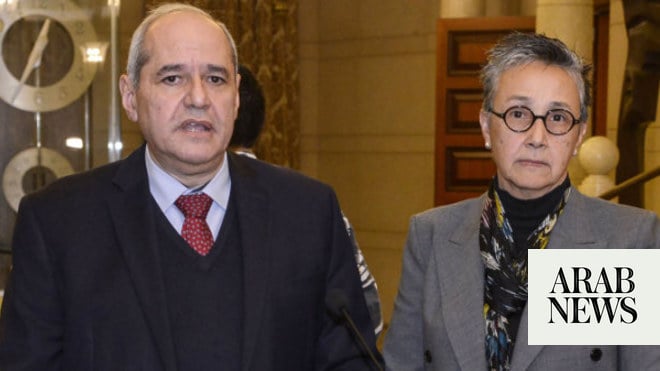
BEIRUT: Lebanese authorities on Monday began removing concrete barriers around the country’s parliament building after the election of former protesters as MPs.
The security measures had been put in place at the outbreak of massive anti-government protests in 2019. They are to be relaxed following the election of a dozen reformist newcomers to the 128-member legislature, including some who had taken part in the protest movement.
Some of the new MPs had called for the restrictions to be eased before they attended the first session of the new parliament.
Interior Minister Bassam Mawlawi attended the start of the work yesterday afternoon.
The clearing will be completed before the next parliament session is held, a statement from House Speaker Nabih Berri’s office said.
The move comes after the election of 15 MPs from the Forces of Change group, which was demonstrating in the streets around parliament, in addition to a number of independent MPs.
Beirut MP Ibrahim Mneimneh, from the Forces of Change, said: “There is no need for the barriers placed around the people’s house because it is for the people. They are needless barriers.”
He said that the measures decided by Berri were the result of the traditional ruling forces realizing “the decline of their popularity, so they decided to respond to the popular demands.”
MP Waddah Sadiq, a former protester, said the fences around parliament are a separation wall. “Today, parliament represents the people who demand change, so they decided to ease the procedures,” Sadiq sad.
Sadiq said that the economic and living crises “are increasing, and people may turn to a state of rejection again. We need the pressure to address them.”
He said that the previous government did not take any effective handling measures.
The plan approved by the government included neither recovery nor economy, said the MP. “Therefore, we are entering a difficult phase and we will be on the side of the people.”
MP Elias Jarada, an ophthalmologist from the southern town of Ibl Al-Saqi, called the "doctor of the poor," said that “the parliament is the house of the people, and there are no fences that can separate the representatives of the nation and the citizens.”
He said that all the barriers that prevent people from entering Nejmeh Square must be removed before the MPs are invited to any session.
Ali Hamdan, the media adviser to the parliamentary speaker, told Arab News that “these measures are not an indication of excessive confidence. Rather, elections were held and the results have brought representatives of the protesters to parliament.”
He said: “These people represent part of the street, and you may call them a movement, an uprising or a change.”
He said the speaker had decided to take a step to reduce security measures, but they “will not be completely lifted around the parliament.”
He said that some in Lebanon still feared security setbacks.
“There are successive crises, including the customs dollar and the rise in telecom prices, and we witnessed what happened in Greece and Cyprus.”
The area around the building had been transformed by concrete walls that blocked all the roads leading to Nejmeh Square.
Hotels in the area closed as a result of the damages they suffered from each wave of popular protests targeting parliament since Oct. 17, 2019.
Institutions, companies and shops all moved out of the area after it became difficult to reach them. The area turned into a ghost town as a result of power outages and the absence of people.
Parliament meetings there were suspended after the explosion of the port of Beirut on Aug. 4, 2020, which damaged the building.
The parliament moved its meetings temporarily to the UNESCO Palace, which is on the western-south edge of the capital.
While the temporary location provided a spacious hall, comfortable seats and social distancing as required during the pandemic, it did not provide electronic voting for deputies or the electronic list for the attendance of deputies.
Bechara Asmar, head of General Labor Union, said he was concerned about “the continuation of sterile debates while crises become more complex.”












